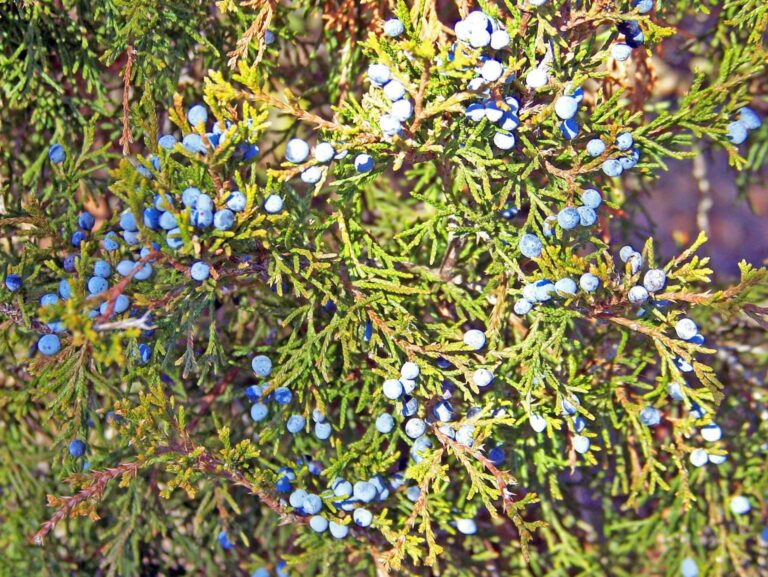When you’re living off the land, there’s a wide variety of edible plants from which you can choose to eat. On the other hand, there’s also a wide variety of inedible plants which will make you very sick (or worse) if ingested.
With that in mind, it’s important to know what you’re eating. When it comes to juniper plants/berries, you can find them in Africa, North America, the Middle East and Asia and they look rather appetizing but are they safe to eat or are they poisonous? Are juniper berries poisonous?

Yes, most juniper berries are poisonous, though some contain only small amounts of thujone, a toxic compound, which may make some varieties safe to eat in small quantities.
Some berries are safe to eat in small quantities. High quantities can cause vomiting, diarrhea, convulsions, stomach pains; they can also have a serious negative impact on your kidneys, and, in some cases, they can be fatal.
Types of Juniper Plants
Most juniper plants are poisonous to some extent, but some are more poisonous than others. The most common juniper plants are Juniperus Communis and Juniperus Sabina. Juniperus Communis and is considered the safest one to eat. As such, it’s commonly used as a flavorant in drinks and in cooking.
Other plants which produce safe berries are:
- Juniperus deppeana
- Juniperus phoenicea
- Juniperus californica
- Juniperus druppacea
It’s important to note that you should not eat these in high quantities.
Juniperus Sabina or the Savin Juniper contains savin oil, which is highly toxic and, in a best- case scenario, will lead to vomiting, diarrhea, and stomach pain. In a worst-case scenario, ingestion of savin oil can be fatal.
There are other toxic variants of juniper berries which contain volatile oils which may cause problems of varying severity.
Uses
Juniper berries have a powerful effect on your kidneys and can cause serious problems when eaten in high quantities. They’ve been used in food since ancient times, but as far as medicinal use goes there is lacking scientific evidence of efficacy.
With that said, it has been claimed more than once that juniper berries could be used to alleviate certain conditions. These conditions include but are not limited to:
- Dyspepsia
- Arthritis
- Insomnia
- Bronchitis
- High Cholesterol
- Rashes and eczema
Side Effects and Toxicity
Medicinal uses for juniper plants are limited by the presence of toxic oils like savin oil (Juniperus sabina) and thujone oil – which is present in all juniper plants.
Savin oil contains podophyllotoxin which destroys the body’s cells – resulting in fatalities. Thujone is the oil which, in high quantities, causes stomach pain, diarrhea, and kidney problems.
When it comes to side effects, there are a few that have been documented including:
- Skin rash
- Breathing difficulties
- Kidney damage
- Increased sugar levels
Additionally, some people are allergic to juniper berries and will have bad reactions to consumption which will require medical attention. High levels of juniper berries can cause diarrhea, vomiting, and convulsions.
Making Infusions
As for culinary uses…well…like most berries, juniper berries have made their way into many different dishes as a coloring agent, and flavorant notably in alcoholic beverages like Gin.
Now, if they’re poisonous then why is it that foods / drinks containing juniper berries / berry extract are sold/eaten? Well, here’s the thing; usually, there are only traces of the berry/berry extract – enough to give flavor/color.
Juniper berries have a powerful effect on your kidneys and can cause serious problems when eaten in high quantities. To avoid this, most drinks are made via infusion; you add a tablespoon of juniper berries to a bottle of spirits (i.e. vodka) and leave it for about a week in a cool, dark place. You can then add any other flavors (cinnamon, orange zest, etc.) that you like.
Once the infusing is done, you filter the berries and other flavoring agents. This allows you to have the flavor of juniper berries with little to no exposure to the toxic oils – the oils are, after all, located inside the fruit.
In Conclusion: Not Recommended for Consumption
To recap:
- Yes, most juniper berries are poisonous, but some are more poisonous than others.
- Berries of certain juniper plants are safe to eat in small quantities.
- There’s limited research into medicinal use/health benefits, but claims have been made about using juniper berries to alleviate certain conditions.
- Toxic levels of juniper berries will cause either physical discomfort or they can be fatal.
I’ve said it before, and I’ll say it again; don’t eat something if you don’t know what it is!
There are certain juniper berries which are safe to eat, but it’s generally not recommended for consumption. They don’t have a nice flavor and the risk of poisoning and/or allergic reactions is just not worth it.
With all that said, I hope you enjoyed the article and found it informative. Thank you for reading and I’ll see you again in the next one! Take care.
No comments:
Post a Comment